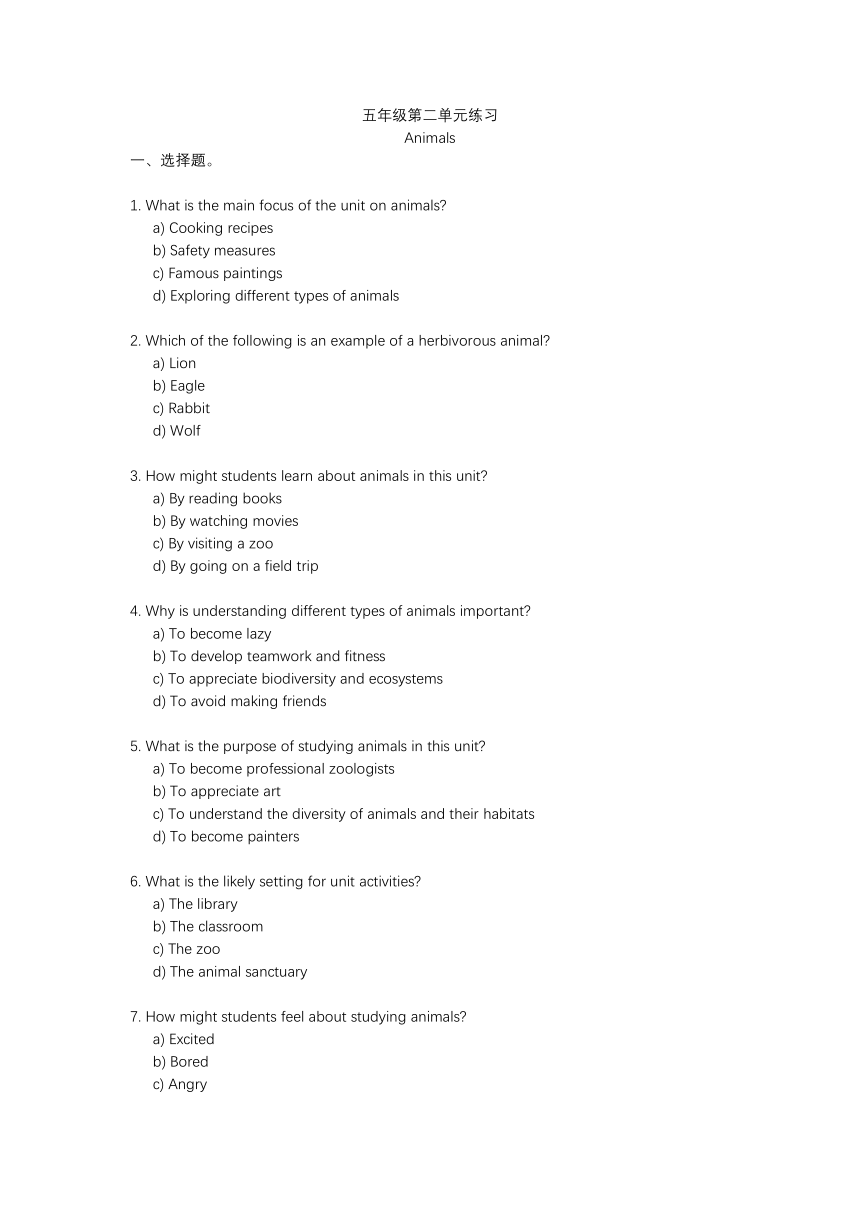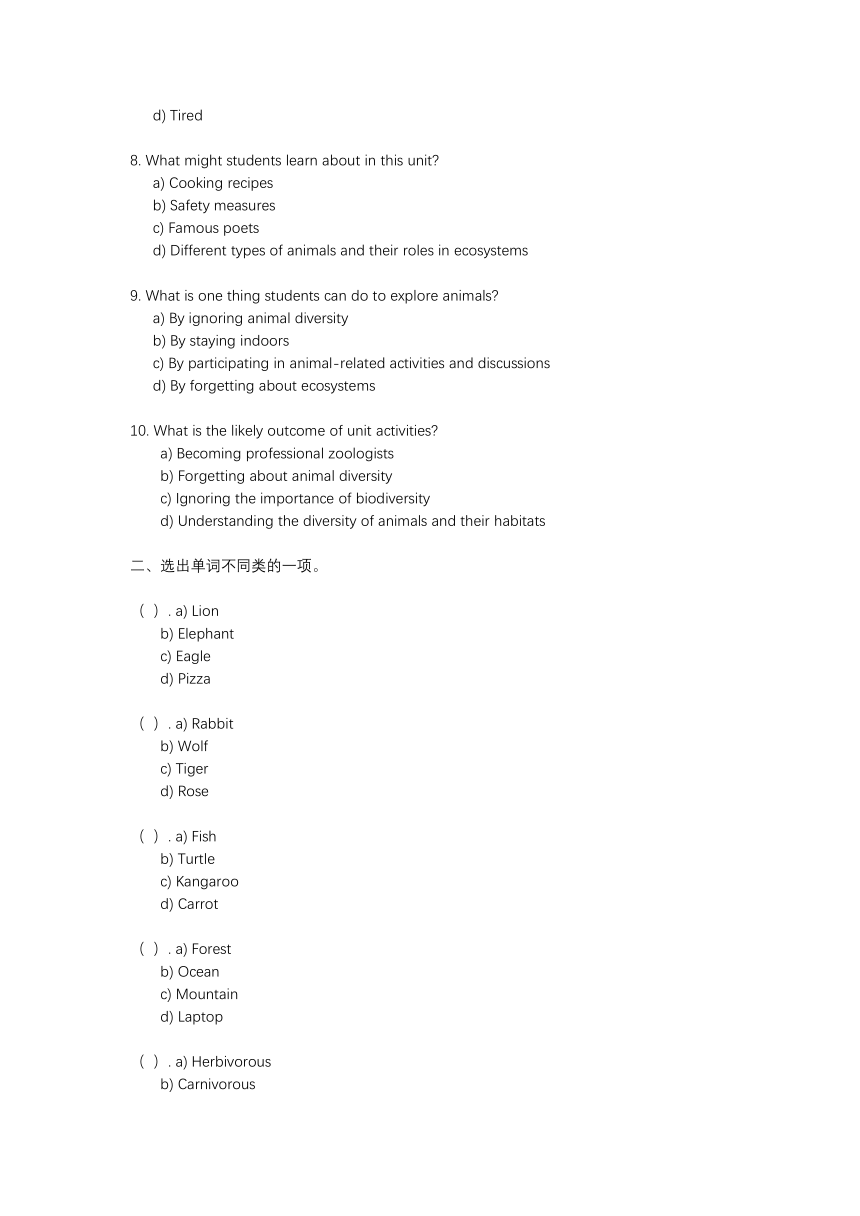Unit 2 Animals单元测试 (无答案)
文档属性
| 名称 | Unit 2 Animals单元测试 (无答案) |

|
|
| 格式 | docx | ||
| 文件大小 | 20.1KB | ||
| 资源类型 | 教案 | ||
| 版本资源 | 北师大版(三年级起点) | ||
| 科目 | 英语 | ||
| 更新时间 | 2023-11-20 00:00:00 | ||
图片预览


文档简介
五年级第二单元练习
Animals
一、选择题。
1. What is the main focus of the unit on animals
a) Cooking recipes
b) Safety measures
c) Famous paintings
d) Exploring different types of animals
2. Which of the following is an example of a herbivorous animal
a) Lion
b) Eagle
c) Rabbit
d) Wolf
3. How might students learn about animals in this unit
a) By reading books
b) By watching movies
c) By visiting a zoo
d) By going on a field trip
4. Why is understanding different types of animals important
a) To become lazy
b) To develop teamwork and fitness
c) To appreciate biodiversity and ecosystems
d) To avoid making friends
5. What is the purpose of studying animals in this unit
a) To become professional zoologists
b) To appreciate art
c) To understand the diversity of animals and their habitats
d) To become painters
6. What is the likely setting for unit activities
a) The library
b) The classroom
c) The zoo
d) The animal sanctuary
7. How might students feel about studying animals
a) Excited
b) Bored
c) Angry
d) Tired
8. What might students learn about in this unit
a) Cooking recipes
b) Safety measures
c) Famous poets
d) Different types of animals and their roles in ecosystems
9. What is one thing students can do to explore animals
a) By ignoring animal diversity
b) By staying indoors
c) By participating in animal-related activities and discussions
d) By forgetting about ecosystems
10. What is the likely outcome of unit activities
a) Becoming professional zoologists
b) Forgetting about animal diversity
c) Ignoring the importance of biodiversity
d) Understanding the diversity of animals and their habitats
二、选出单词不同类的一项。
( ). a) Lion
b) Elephant
c) Eagle
d) Pizza
( ). a) Rabbit
b) Wolf
c) Tiger
d) Rose
( ). a) Fish
b) Turtle
c) Kangaroo
d) Carrot
( ). a) Forest
b) Ocean
c) Mountain
d) Laptop
( ). a) Herbivorous
b) Carnivorous
c) Omnivorous
d) Classroom
( ). a) Zoo
b) Library
c) Playground
d) Desert
( ). a) Excited
b) Bored
c) Happy
d) Tired
( ). a) Diversity
b) Forget
c) Ignore
d) Celebrate
( ). a) Explore
b) Forget
c) Ignore
d) Study
( ). a) Jungle
b) Elephant
c) Restaurant
d) Giraffe
三、填入适当的词语来完成对话。
1. A: __________, did you hear that we're studying animals in this unit
B: Yes, I'm so __________! I love learning about different types of animals.
2. A: I hope we get to __________ a real zoo during a field trip.
B: That would be interesting! We could even see animals like lions and elephants up close.
3. A: I wonder if we'll learn about the __________ between different types of animals.
B: Maybe. It's important to understand how each animal __________ in its ecosystem.
4. A: I heard there's a new __________ about endangered species. We should watch it.
B: Definitely! I love watching __________ about wildlife conservation.
5. A: I hope the activities in this unit are more __________ than the ones last year.
B: I agree. Let's ask the teacher if we can have a __________ about animals.
6. A: Do you think we'll have a __________ about the importance of biodiversity
B: I hope so. It's crucial for us to understand how __________ ecosystems.
7. A: I'm __________ to explore different habitats and learn about the animals that live there.
B: That's a great attitude! We can also __________ ways to protect animal habitats.
8. A: Let's start a __________ about wildlife. We can share interesting facts and discuss conservation efforts.
B: That's a fantastic idea! We can even organize a __________ to raise awareness.
四、阅读理解。
In this unit, students will embark on a journey to discover the diverse habitats that animals call home. The unit will cover various ecosystems, including forests, oceans, deserts, and jungles, and explore the unique characteristics of each habitat.
To make the learning experience more engaging, the classroom will transform into a mini-zoo, showcasing models and images of animals from different habitats. Students will have the opportunity to study these displays, learn about the animals' adaptations, and understand the interdependence of species within each ecosystem.
As part of the unit, students will also participate in
activities such as creating dioramas, researching specific animals, and presenting their findings to the class. These hands-on activities aim to deepen students' understanding of the intricate relationships between animals and their habitats.
The unit concludes with a reflection session where students will share their favorite discoveries and discuss the importance of preserving diverse habitats for the well-being of our planet.
.What is the main focus of the passage
a) Cooking recipes
b) Safety measures
c) Discovering diverse animal habitats
d) Art projects
What ecosystems will students explore in this unit
a) Forests, oceans, deserts, and jungles
b) Cooking techniques, art studios, libraries, and playgrounds
c) Ignoring ecosystems
d) Forgetting about animal habitats
How will the classroom be transformed to enhance the learning experience
a) By ignoring displays
b) By transforming into a mini-zoo with models and images
c) By avoiding interaction with students
d) By forgetting about diverse habitats
What is the goal of the unit's concluding reflection session
a) To become lazy
b) To forget about diverse habitats
c) To understand the importance of preserving diverse habitats for the well-being of our planet
d) To avoid making friends
五、作文题。
描述一次你在学校或社区参与的关于动物栖息地的活动,以及你从中学到的重要教训。
Animals
一、选择题。
1. What is the main focus of the unit on animals
a) Cooking recipes
b) Safety measures
c) Famous paintings
d) Exploring different types of animals
2. Which of the following is an example of a herbivorous animal
a) Lion
b) Eagle
c) Rabbit
d) Wolf
3. How might students learn about animals in this unit
a) By reading books
b) By watching movies
c) By visiting a zoo
d) By going on a field trip
4. Why is understanding different types of animals important
a) To become lazy
b) To develop teamwork and fitness
c) To appreciate biodiversity and ecosystems
d) To avoid making friends
5. What is the purpose of studying animals in this unit
a) To become professional zoologists
b) To appreciate art
c) To understand the diversity of animals and their habitats
d) To become painters
6. What is the likely setting for unit activities
a) The library
b) The classroom
c) The zoo
d) The animal sanctuary
7. How might students feel about studying animals
a) Excited
b) Bored
c) Angry
d) Tired
8. What might students learn about in this unit
a) Cooking recipes
b) Safety measures
c) Famous poets
d) Different types of animals and their roles in ecosystems
9. What is one thing students can do to explore animals
a) By ignoring animal diversity
b) By staying indoors
c) By participating in animal-related activities and discussions
d) By forgetting about ecosystems
10. What is the likely outcome of unit activities
a) Becoming professional zoologists
b) Forgetting about animal diversity
c) Ignoring the importance of biodiversity
d) Understanding the diversity of animals and their habitats
二、选出单词不同类的一项。
( ). a) Lion
b) Elephant
c) Eagle
d) Pizza
( ). a) Rabbit
b) Wolf
c) Tiger
d) Rose
( ). a) Fish
b) Turtle
c) Kangaroo
d) Carrot
( ). a) Forest
b) Ocean
c) Mountain
d) Laptop
( ). a) Herbivorous
b) Carnivorous
c) Omnivorous
d) Classroom
( ). a) Zoo
b) Library
c) Playground
d) Desert
( ). a) Excited
b) Bored
c) Happy
d) Tired
( ). a) Diversity
b) Forget
c) Ignore
d) Celebrate
( ). a) Explore
b) Forget
c) Ignore
d) Study
( ). a) Jungle
b) Elephant
c) Restaurant
d) Giraffe
三、填入适当的词语来完成对话。
1. A: __________, did you hear that we're studying animals in this unit
B: Yes, I'm so __________! I love learning about different types of animals.
2. A: I hope we get to __________ a real zoo during a field trip.
B: That would be interesting! We could even see animals like lions and elephants up close.
3. A: I wonder if we'll learn about the __________ between different types of animals.
B: Maybe. It's important to understand how each animal __________ in its ecosystem.
4. A: I heard there's a new __________ about endangered species. We should watch it.
B: Definitely! I love watching __________ about wildlife conservation.
5. A: I hope the activities in this unit are more __________ than the ones last year.
B: I agree. Let's ask the teacher if we can have a __________ about animals.
6. A: Do you think we'll have a __________ about the importance of biodiversity
B: I hope so. It's crucial for us to understand how __________ ecosystems.
7. A: I'm __________ to explore different habitats and learn about the animals that live there.
B: That's a great attitude! We can also __________ ways to protect animal habitats.
8. A: Let's start a __________ about wildlife. We can share interesting facts and discuss conservation efforts.
B: That's a fantastic idea! We can even organize a __________ to raise awareness.
四、阅读理解。
In this unit, students will embark on a journey to discover the diverse habitats that animals call home. The unit will cover various ecosystems, including forests, oceans, deserts, and jungles, and explore the unique characteristics of each habitat.
To make the learning experience more engaging, the classroom will transform into a mini-zoo, showcasing models and images of animals from different habitats. Students will have the opportunity to study these displays, learn about the animals' adaptations, and understand the interdependence of species within each ecosystem.
As part of the unit, students will also participate in
activities such as creating dioramas, researching specific animals, and presenting their findings to the class. These hands-on activities aim to deepen students' understanding of the intricate relationships between animals and their habitats.
The unit concludes with a reflection session where students will share their favorite discoveries and discuss the importance of preserving diverse habitats for the well-being of our planet.
.What is the main focus of the passage
a) Cooking recipes
b) Safety measures
c) Discovering diverse animal habitats
d) Art projects
What ecosystems will students explore in this unit
a) Forests, oceans, deserts, and jungles
b) Cooking techniques, art studios, libraries, and playgrounds
c) Ignoring ecosystems
d) Forgetting about animal habitats
How will the classroom be transformed to enhance the learning experience
a) By ignoring displays
b) By transforming into a mini-zoo with models and images
c) By avoiding interaction with students
d) By forgetting about diverse habitats
What is the goal of the unit's concluding reflection session
a) To become lazy
b) To forget about diverse habitats
c) To understand the importance of preserving diverse habitats for the well-being of our planet
d) To avoid making friends
五、作文题。
描述一次你在学校或社区参与的关于动物栖息地的活动,以及你从中学到的重要教训。
